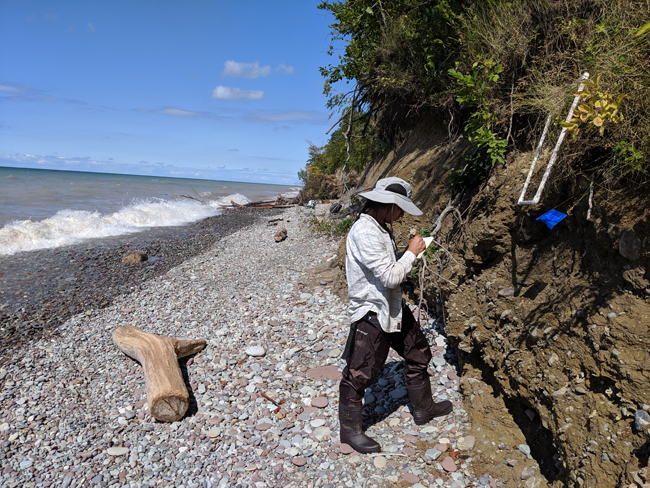
Pilot-monitoring of shoreline features at a site in the Great Lakes region. Credit: Katie Graziano, Science & Resilience Institute at Jamaica Bay
Natural and nature-based features are included in a statewide framework piloted by NYSG and partners for monitoring the effectiveness of a variety of shoreline management practices
Contact:
Helen Cheng, NYSG Coastal Resilience Extension Specialist, P: 718-951-5415, E: helen.cheng@cornell.edu
Brooklyn, NY, March 2, 2020 - Interest has grown throughout New York State in options for innovative shoreline management as an alternative to traditional structural features. Using innovative features has the potential to limit negative impacts such as shoreline erosion, and may increase or sustain natural shoreline processes, providing ecological, mitigation, and socio-economic benefits. However, monitoring data are needed to determine the effectiveness of utilizing natural and nature-based features over traditional structures.
New York Sea Grant (NYSG) partnered with organizations to develop a framework to monitor the performance of shoreline types including hardened structures, nature-based structures, and natural features. NYSG Coastal Processes and Resiliency Extension Specialists served as leads for the state’s New York City, Long Island, and Great Lakes areas. The draft framework was piloted at multiple sites in each region, including New York City’s Randall Island, Long Island’s Widow’s Hole; Sodus Point Beach park on Lake Ontario; and the Hudson River Estuary’s Coxsackie Boat Launch.
The feedback from participants of the regional workshops; local, state, and federal permit reviewers; the project advisory committee; and piloting in the respective regions allowed for the protocols to be refined by the project’s technical working groups and for the finalization of the monitoring framework for shoreline features in NYS. The ecological function, hazard mitigation, structural integrity, and socio-economic indicators in the framework are designed to be applicable across a full spectrum of features from hardened infrastructure to natural features.
The results were presented at the 2019 NY-NJ Harbor and Estuary Program’s annual conference. Sharing lessons learned and building a network of regional stakeholders, technical experts, and regulators have been integral to the development of a statewide monitoring framework for various shoreline features.
Learn more at www.nyseagrant.org/nyshorelines.
The Sea Grant Focus Area for this project is Resilient New York Communities and Economies.
Project Partners:
• Science and Resilience Institute at Jamaica Bay
• SCAPE Landscape Architecture
• Arcadis
• City University of New York
• NY-NJ Harbor and Estuary Program
• New York City Department of Parks and Recreations
• New York State Department of Environmental Conservation
• New York State Department of State (co-funder)
• New York State Energy and Research Development Authority (co-funder)
More Info: New York Sea Grant
New York Sea Grant (NYSG), a cooperative program of Cornell University
and the State University of New York (SUNY), is one of 34 university-based
programs under the National Oceanic and Atmospheric Administration’s
National Sea Grant College Program.
Since 1971, NYSG has represented a statewide network of integrated
research, education and extension services promoting coastal community
economic vitality, environmental sustainability and citizen awareness
and understanding about the State’s marine and Great Lakes resources.
Through NYSG’s efforts, the combined talents of university scientists
and extension specialists help develop and transfer science-based
information to many coastal user groups—businesses and industries,
federal, state and local government decision-makers and agency managers,
educators, the media and the interested public.
The program maintains Great Lakes offices at Cornell University, SUNY
Buffalo, SUNY Oswego and the Wayne County Cooperative Extension office
in Newark. In the State's marine waters, NYSG has offices at Stony Brook
University in Long Island, Brooklyn College and Cornell Cooperative
Extension in NYC and Kingston in the Hudson Valley.
For updates on Sea Grant activities: www.nyseagrant.org has RSS, Facebook, Twitter, and YouTube links. NYSG offers a free e-list sign up via www.nyseagrant.org/nycoastlines for its flagship publication, NY Coastlines/Currents, which is published quarterly. Our program also produces an occasional e-newsletter,"NOAA Sea Grant's Social Media Review," via its blog, www.nyseagrant.org/blog.